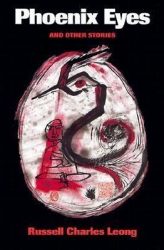 Phoenix Eyes
Phoenix Eyes
And Other Stories
by Russell Charles Leong
Published by University of Washington Press
Published May 1, 2000
Fiction (short stories)
208 pgs. • Find on Amazon.com
Reviewed by Stephen O. Murray
January 24, 2001.
Russell Leong has written a sensational story, “Where Do People Live Who Never Die?”, which closes his collection of short stories, Phoenix Eyes and Other Stories.
What happened to the parents in China (that U.S. citizen father and the CCP official mother) does not become clear through attempts to find out. The multiple official explanations and the impossibility of knowing and understanding are the point: the clues don’t add up, and much remains unknowable.
The other side of the frame, the opening story, “Bodhi Leaves,” suggests that adequate representation is possible. It may take more than one artist, however.
Many of the stories involve a somewhat devoted Buddhist gay man approaching age 50 in the era of AIDS. There is one (slight) story about a protégé of a (younger) soul brother who died of AIDS (“Samsara”) and the title story in which a close friend who got the narrator into the game of prostitution for intercontinental upper-class clients, dies.
In Asian families, you would just disappear. Your family, if you have one, rents a small room for you… They simply could not call AIDS by its proper name: any other name would do—cancer, tuberculosis, leukemia. Better handle it yourself, keep it within the family. Out of earshot. (p. 143)[1]A variant poetic version ends the collection he edited for the journal Amerasia, published separately by Routledge as Asian American Sexuality.
My favorites stories are the ones redolent with irony about the odd relationships a Chinese-American gay man has: “Hemispheres” in which three women decide that the narrator should supply sperm to impregnate them, “Camouflage” in which a part-time stripper and Asian-PWA service-organization volunteer is confronted with a knowing client’s desire, “A Yin and Her Man” in which a bisexual Asian American man seeks details about her current Asian immigrant boyfriend from a woman who has left him, and “Phoenix Eyes.” The title story seems to be about a career of male prostitution but is really about the relationship between the narrator and his mentor/friend.
“No Bruce Lee” is a slight but cutting story about a black man who wants the narrator, even though he’s no Bruce Lee (as the black man keeps telling him).
Along with the movies Ghost Dog and Brother (about both of which I have written epinions recently), this is an interesting account of African American appropriation of Asian icons and ideologies. Euro-American appropriation of both Asian and diasporic African culture is widely discussed, but the interest in non-white warriors by African Americans has not to my knowledge been written about.

I noticed that across all of Leong’s stories of sexual desire, the initiatives are taken by someone other than the narrator(s). The narrators’ desires exist, or at least flicker, but mostly they respond to being desired, usually responding with confusion and ambivalence, while being as compassionate as he feels able to be. Except for the commercial clients, the desiring ones are not white.
“Eclipse” a short play about a closeted Japanese-American professor studying sexual self-representations mau-maued by a preoperative African-American transsexual and her butch Chinese-American macho partner rings false to me: it strikes me as almost all ideology:
I found the blackness in me. Under my yellow skin, under these oblique lids here, was a darker man waiting to be born. A dark man desiring a darker man. (p. 108)
Leaving aside the reach for “colored” solidarity, has there ever been a human being who spoke of having “oblique lids”? Its agitprop stick figures painfully contrast to the complex human beings in the other stories. I’d have to say that Asian(/-American) interest in African culture is even less documented and discussed than African American interest in Asian cultures.
I’m not sure what the point is of the story that cannot be autobiographical, “The Western Paradise of Eddie Bin.” The sadness of faked assimilation? The impossibility of acceptance in any world? Leong marshals specific melancholy details, but to no clear purpose or end(ing).
There are some more experimental narratives about the pains of diaspora in the first set of stories, along with stories of Buddhists and Buddhism in California. Of these, “Geography One” is the most striking.
Although uneven in development and quality, this collection includes some very moving stories and many striking images. The prose is as lean and powerful as Bruce Lee, the iconic strong, silent Chinese man.
originally posted on epinions 24 Jan. 2001
©2001, 2016, Stephen O. Murray

